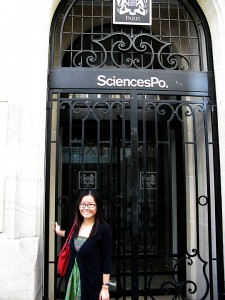Studying at a French university with French students is one of my most exciting French adventures of the year. During my year-long exchange in Paris, I take all my classes at Paris Institute of Political Studies (Sciences Po Paris). Coming from Grinnell to Sciences Po was a difficult adjustment not just because all my classes are in French—the real challenge is the French methodology and the Sciences Po system.
To start off, here is some basic information about the French high educational system, which can be generally divided into two parts: universités and grandes écoles. While students who hold a baccalauréat (an academic qualification at the end of high school) could easily get into public universities, grandes écoles are highly selective and usually considered the elitist schools. Many students have to prepare for a very difficult exam (concours) in order to get into these schools. Since its foundation in 1872, Sciences Po aims to educate France’s political and diplomatic elite. Almost all the French politicians or diplomats, including the former French presidents François Mitterrand and Jacques Chirac, have attended Sciences Po. Thus, although Sciences Po is still very “French” in its system and methodology, it has a different mission from many other French universities. Thus, although my experience at Sciences Po has helped me understand the French academic world, such understanding is sometimes confined by the Sciences Po system and its methodology.
The French methodology of academic work seems very peculiar to many international students in the beginning. Your work—either presentation or paper—has to follow a certain pattern very strictly. Such emphasis on structure is even more significant at Sciences Po. Take an example from my History of International Relation class: you are asked to do a presentation on whether the year 1924 was a turning point in the history of international relations. According to the classical Sciences Po oui-mais (yes-but) structure, you divide your presentation in two parts (these two parts have to be equally detailed). The first part you explain why 1924 was the turning point with various arguments and examples. BUT, in the second part you nuance the situation by explaining why 1924 was not sufficient to be a decisive turning point and establish a stable world system. As this oui-mais structure works in almost all topics, it becomes the most common structure for presentations and papers. However, recently more and more professors at Sciences Po warn their students of using such a structure, which potentially petrify students’ way of thinking.
Nonetheless, even if you do not choose the oui-mais model, you still need to nuance your argument. The word nuancer is the key of the French academic system. As my French methodology professor told every student in the very beginning: “nothing is absolutely right or wrong so you can always ‘nuance’ the situation.” Such an emphasis is not only reflected in the body of your presentation, but also in the conclusion. Instead of giving a certain and strong conclusion of your idea, you usually try to come up with an “opening ending”. That is exactly the opposite of the American methodology—at Grinnell, we are trained to argue for our point as strongly as possible. However, the French system requires a certain level of ambiguity in your entire argument.
Since I have been in France, I have various debates on the American and the French methodology with both French and American students. In fact, coming from the American methodology, I could not understand the French methodology at all in the very beginning—what is the point to spend half of your time saying “yes” and then the other half saying “but”? However, as I understand the methodology better, I gradually find it reasonable to always nuancer a topic. While the American methodology teaches me to prove my point as strongly as possible, the French methodology reminds me to always pay attention to subtleties of different subjects. After all, in social sciences and humanities, nothing is absolutely right or wrong. It is difficult to judge which methodology works better to form critical thinking. The two methodologies just have different emphasis. However, the two systems do have something in common: no matter for Sciences Po stduents or for Grinnellians, college writing 101 always gives them their first headache in their college academic life.
-Liyan Chen ’12























































